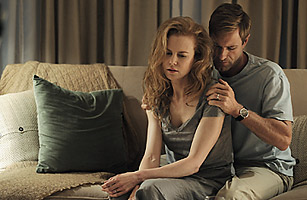
After the loss of their son, Kidman and Eckhart try to move on
Rabbit Hole
Directed by John Cameron Mitchell
With Nicole Kidman and Aaron Eckhart
Opens 12.17
She needs help finding somebody's number on her husband's cell phone. He walks over to help, and they stand inches apart. A year ago, in their tender, decent marriage, she'd have concluded the lesson with a lovingly automatic kiss. Now she can offer only a wan smile and a thank-you. It's not a rebuke, just the maximum amount of grace a grieving woman can summon.
Eight months after the death of their young son in a car accident, Becca (Nicole Kidman) and Howie (Aaron Eckhart) are still in a kind of walking shock, adjusting to their misery, feeling that the best part of them died in the accident. Becca seems more deeply mired in remorse than Howie, but being close reminds them only of their estrangement from each other. They could both use a change. Can Howie find warmth in another woman and Becca, somehow, in another son? Perhaps she can take comfort in the notion of parallel universes: that this world "is just the sad version of us" and that "somewhere out there I'm having a good time."
The story of a couple who have lost their only child: there have been so many of those, so many books and movies and Lifetime dramas, most of which pluck the heartstrings like a cheap fiddle, that simply to hear the plot of Rabbit Hole could induce a case of mourning sickness. But the tone achieved by writer David Lindsay-Abaire (adapting his Pulitzer Prize—winning play) and director John Cameron Mitchell (who did the splendidly rambunctious indie films Hedwig and the Angry Inch and Shortbus) is fine and generous, an unbroken series of poignant, privileged moments.
Kidman, in a career-best performance, and Eckhart lend pitch-perfect calibration to the couple's shared or separate agony, which is conducted often in whispers and silences. It's as if previous treatments of the subject were a series of failed experiments, and Rabbit Hole is the Eureka! moment. This is how movies can bring a great, grave theme to indelible dramatic life.